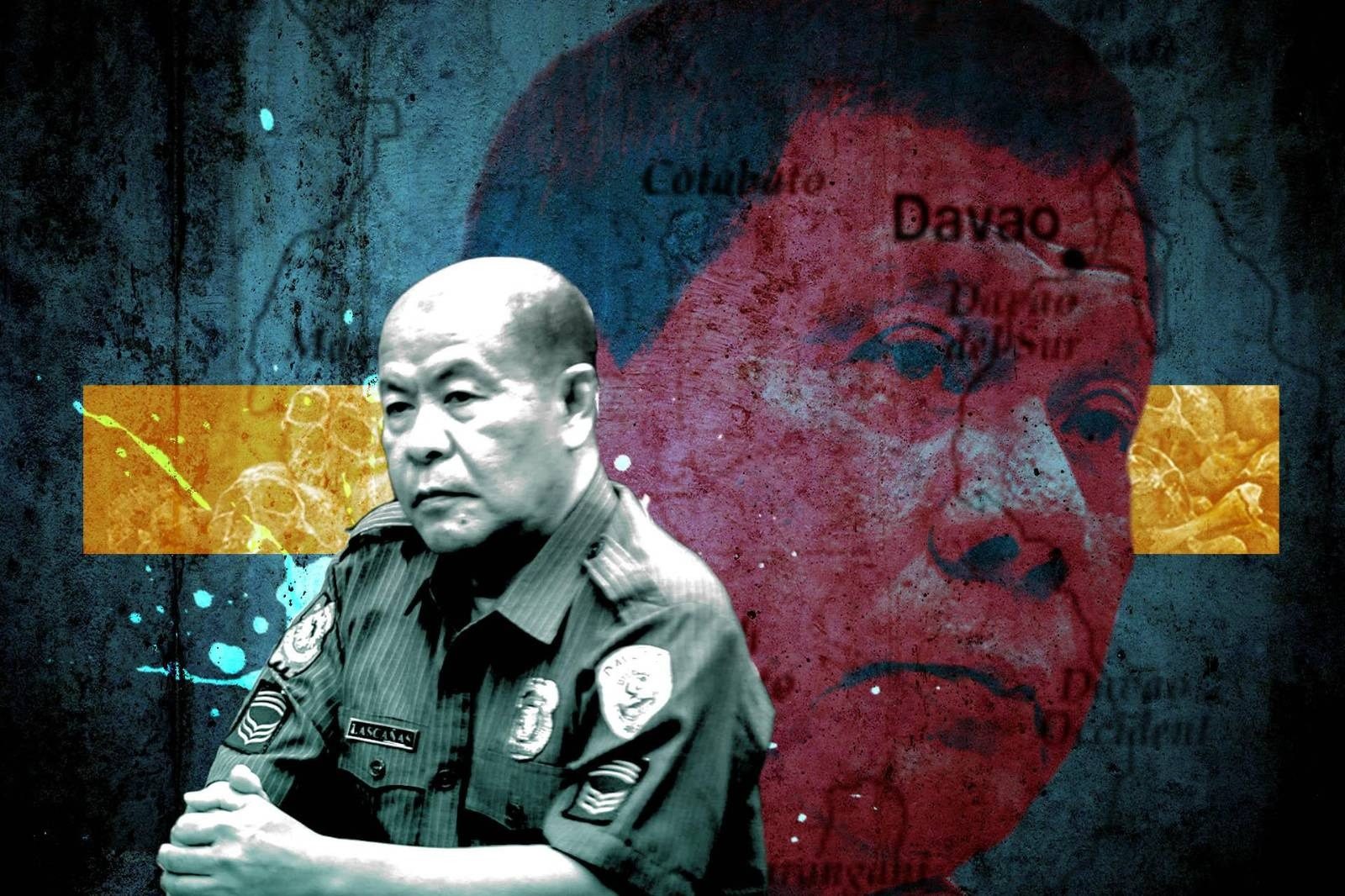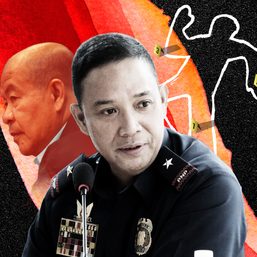SUMMARY
This is AI generated summarization, which may have errors. For context, always refer to the full article.

Rodrigo Duterte emerged as a dark character, a local ruthless boss who presided over operations to terminate suspected drug users, dealers and other criminals in Davao City when he was mayor from the late 1980s to 2015.
He created a special police unit to do the arrests, killings and dumping of bodies in common graves. In return, these men were amply rewarded with cash and promotions. The group, which had killed hundreds, came to be known as the Davao Death Squad or DDS.
We may have known this broadly and from a cold distance but we are pulled back deeper into it, as if we were in the scene of the crime, face-to-face with the killers and victims, courtesy of an insider’s harrowing account. Retired police officer Arthur Lascañas submitted a 186-page testimony to the International Criminal Court (ICC) which is currently conducting a full-fledged probe on Duterte’s drug war, including the killings in Davao.
Rappler has reported extensively on Lascañas’ first-hand chronicles: He was an original member of the DDS. He provided a lot of detail into the operations of the DDS, including names of key members, friends of Duterte who enabled his bloody war, the group’s subculture as the members developed their own modus operandi, way of dressing and vocabulary.
Here are some of the stories, in case you missed them:
- THE LASCAÑAS AFFIDAVIT | ‘I killed for Duterte’
- Davao shabu lab raid: ‘Eliminate them all’
- Why the Laud quarry, ‘mass grave’ for DDS victims, haunts Lascañas
- Duterte as ‘Superman’: Lascañas details Davao Death Squad operations
The Lascañas affidavit is one of a number of testimonies given to the ICC. Its value lies in its being an eyewitness account as Lascañas confessed to killing some of the victims in Davao as well as being an accomplice in others.
The ICC will need to corroborate the account of Lascañas. This is where the gathering of evidence will matter most, including documents, photographs, video and audio recordings as well as forensic evidence.
Stepping back, we can see how, through these years, Duterte prostituted the Davao police, treating them like a private army. It is ironic that a former prosecutor practiced and promoted swift justice. He, an officer of the law, essentially bypassed the courts. Instead of reforming and strengthening the judicial system, he weakened it.
Order from Duterte
A key question on the DDS operations is this: Who gave the orders to kill?
Lascañas said that, at times, it was Duterte himself, who went by the code name “Superman.” At other times, it was his close-in aides.
There were indications that the killings were ordered by the mayor, directly or indirectly, and funded by City Hall. Foremost was the giving of cash rewards – tens, if not hundreds of thousands of pesos. Furthermore, the crimes remained unsolved and there was no effort to bring in suspects.
Lascañas cited one instance when Duterte himself ordered the kill. It was on December 31, 2004 during a high-profile raid of a Davao shabu lab located in a warehouse. Eleven mainland Chinese were arrested after six of their Chinese companions were killed in an alleged shootout. The 11 Chinese nationals were eventually killed by Lascañas and other policemen in a quarry site and buried there, in a common grave.
The order to “eliminate them all, and dispose [of them] in a very clean manner that no remains or traces of their bodies could be recovered” was relayed to Lascañas by a senior police officer who was also bodyguard and driver of Duterte for many years.
This order was confirmed by Duterte. When one of the Chinese who was arrested was promising millions of pesos in exchange for their freedom, Lascañas called up the senior police officer/bodyguard after which Duterte came on the line, instructing him to reject the money offer and proceed with the plan.
In some instances, Duterte himself went to the quarry to see to it that high-profile targets were killed.
The mass grave in the six-hectare site, known as the Laud quarry because it was owned by policeman Bienvenido Laud, was maintained by the DDS.
DDS in police stations
What used to be one central DDS in the early years of Duterte’s reign eventually spread out to select police stations in the city. First, there was the Anti-Crime Task Force Office (1988-1998) which morphed into the Heinous Crime Task Group or the Heinous Crimes Investigation Section (2001-2016). This was when it increased its membership and involved the police commanders in Davao City. Select police station commanders were ordered to create their own death squads.
The police group that did the killings first got paid P10,000 per killing which later increased to P15,000 to P20,000. The big operation in 2004 which involved 11 Chinese nationals netted Lascañas and company P50,000.
During operations, they were provided with vehicles, guns, cellular phones and handheld radio communications devices. They were also assured of protection.
Perks included a weekly allowance for gas, meals and drinks in various restaurants paid through a “signing authority.”
Civilians were recruited to the DDS as “force multipliers.” Each was paid P3,000 to P5,000 for every person killed, apart from monthly salary and allowances allegedly from the intelligence funds of Duterte’s office.
The DDS-type of operation was exported to Metro Manila when Duterte became president in 2016. A Reuters investigation in 2017 detailed the operations of a group of policemen from Davao who were transferred to Quezon City and formed the “core of a lethal anti-drug unit.”
Ten of them called themselves the “Davao Boys.” According to Reuters, which analyzed Quezon City Police District crime reports, these cops killed 108 people in anti-drug operations from July 2016 through June 2017, the campaign’s first year, accounting for 39 percent of the city’s body count.
That was only in one area. By now, we know of similar operations that happened in other parts of the city and elsewhere.
Add a comment
How does this make you feel?
![[The Slingshot] Lito Patay’s 4 hours and 38 minutes of infamy](https://www.rappler.com/tachyon/2024/07/Lito-Patay-4-hours-infamy-July-19-2024.jpg?resize=257%2C257&crop=233px%2C0px%2C720px%2C720px)
![[The Slingshot] Alden Delvo has retired](https://www.rappler.com/tachyon/2024/05/slingshot-alden-delvo-05042024.jpg?resize=257%2C257&crop=243px%2C0px%2C720px%2C720px)
![[Rappler Investigates] It’s too darn hot!](https://www.rappler.com/tachyon/2024/05/too-darn-hot-may-2-2024.jpg?resize=257%2C257&crop=310px%2C0px%2C1080px%2C1080px)

![[The Slingshot] Alden Delvo’s birthday](https://www.rappler.com/tachyon/2024/04/tl-alden-delvo-birthday.jpg?resize=257%2C257&crop=263px%2C0px%2C720px%2C720px)



![[WATCH] Bamban POGO scandal: There’s a bigger fish than Alice Guo](https://www.rappler.com/tachyon/2024/07/inside-track-tcard-bamban-pogo.jpg?resize=257%2C257&crop=435px%2C0px%2C1080px%2C1080px)
![[Vantage Point] China’s silent invasion of the Philippines](https://www.rappler.com/tachyon/2024/07/TL-china-silent-invasion-july-16-2024.jpg?resize=257%2C257&crop=318px%2C0px%2C720px%2C720px)


![[The Slingshot] A Duterte and Bato cop named Patay](https://www.rappler.com/tachyon/2024/06/tl-lito-patay.jpg?resize=257%2C257&crop=322px%2C0px%2C720px%2C720px)


![[Vantage Point] The PDEA leaks](https://www.rappler.com/tachyon/2024/05/vantage-point-pdea-probe.jpg?resize=257%2C257&crop=255px%2C0px%2C720px%2C720px)
![[Edgewise] How Duterte can elude ICC arrest](https://www.rappler.com/tachyon/2024/05/thought-leaders-How-Duterte-elude-icc-arrest.jpg?resize=257%2C257&crop=272px%2C0px%2C720px%2C720px)
![[OPINION] Rodrigo Duterte and his ‘unconditional love’ for China](https://www.rappler.com/tachyon/2024/04/rodrigo-duterte-xi-jinping-august-2019.jpeg?resize=257%2C257&crop=91px%2C0px%2C900px%2C900px)
There are no comments yet. Add your comment to start the conversation.